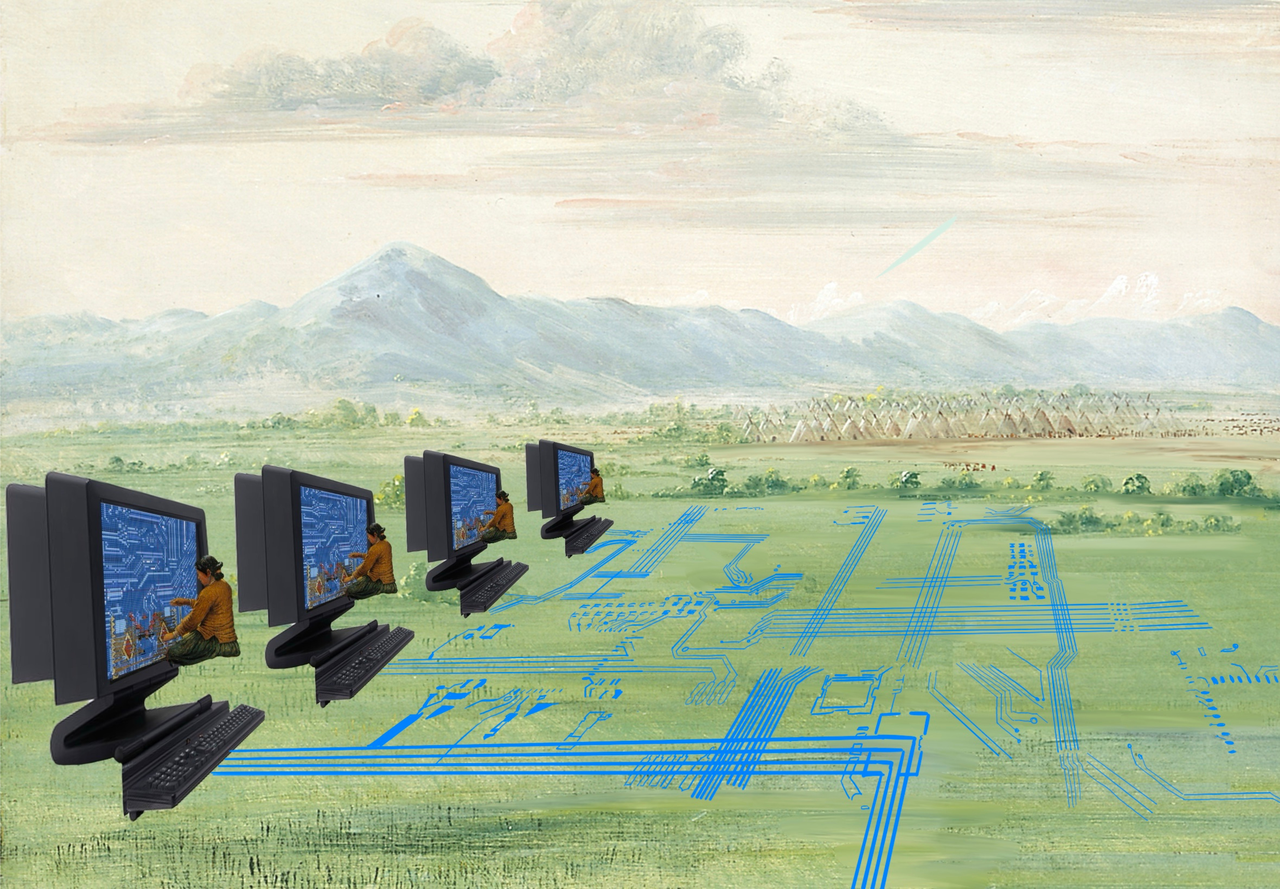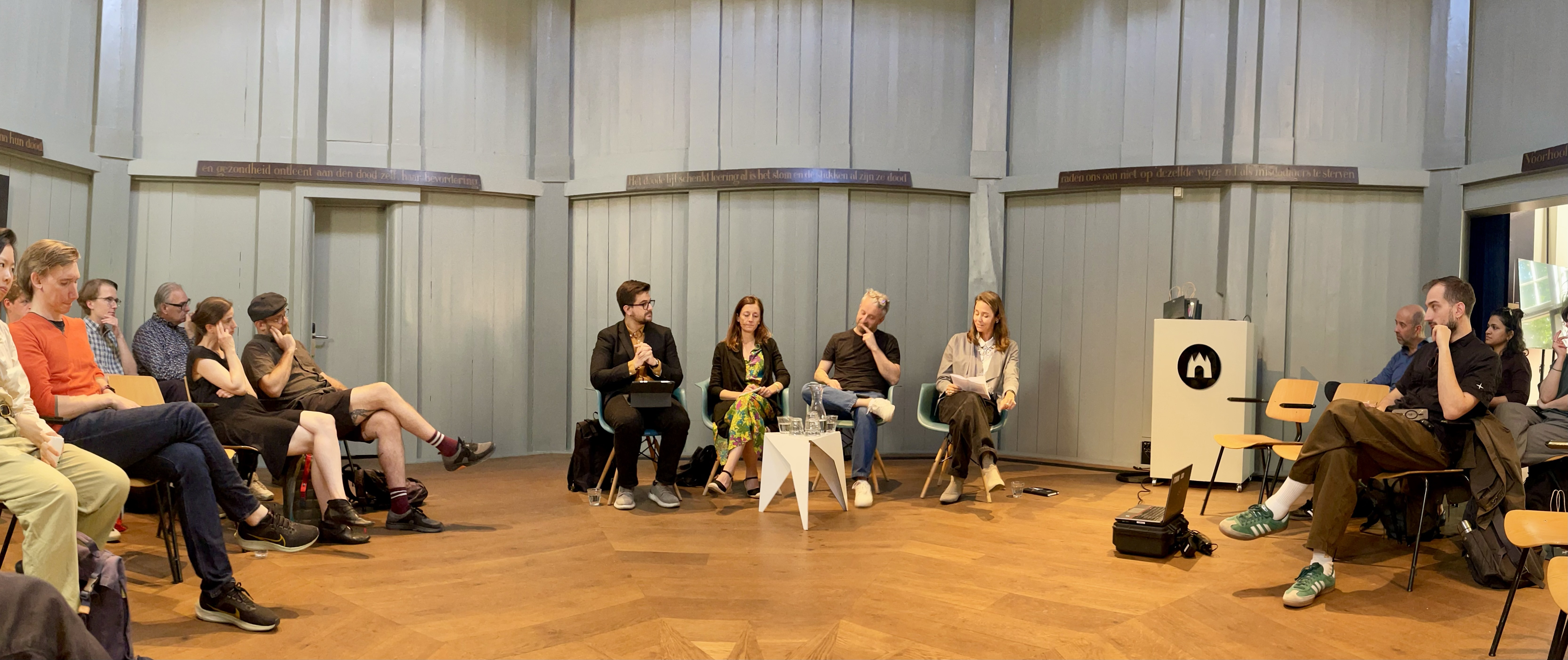July 04, 2025
Imagining the Future of European Digital Infrastructures

We find ourselves at a crossroads: current digital infrastructures are faltering, increasingly dominated by corporate interests and ill-equipped to uphold democratic values. Reform strategies pursued in recent years have repeatedly run into roadblocks, revealing both a lack of political will to regulate the tech industry and insufficient investment in alternative infrastructures. In response to this impasse, the panel 'Imagining the Future of European Digital Infrastructures'—hosted at Waag FutureLab—set out to explore new pathways to address these pressing challenges.

“Our infrastructures are monoliths amalgamating all sorts of different services, with a handful of people sitting on top and making decisions” — Robin Berjon
We are at an impasse. Our current digital infrastructures are not working, which is becoming increasingly clear for a growing number of people. They are co-opted by corporate interests and failing to uphold democratic values in virtually every sense of the word. Yet, the reform strategies deployed over the last years have invariably hit the same walls. There is a lack of political willingness to reign-in the excesses of the tech world and truly invest in developing alternative infrastructure. We are stuck making memos rather than demos.
Taking stock of this complex situation, the panel “Imagining the Future of European Digital Infrastructures” – hosted at the Waag FutureLab on June 20th 2025 – sought to map some new avenues to think about this issue. Moderated by Dr. Corinne Cath-Speth, Head of Digital at the human rights NGO Article 19, it brought together three perspectives from three people sitting at the heart of the current debates on digital infrastructure. Dr. Edemilson Paraná (co-author of the report Reclaiming Digital Sovereignty) focused his intervention on what he called the “digitalised financialisation” underpinning our tech infrastructure, expanding market mechanisms to all sorts of aspects of the social life. The growing uneasiness with our tech stack is, according to Dr. Paraná, related to a wider process where the logic of the market is increasingly present across social life. Thinking new infrastructural paradigms requires, first, to break with market fundamentalism and shift our focus to other issues, like labour conditions or ecological problems. To do so, Paraná proposed the development of a non-aligned tech movement that includes all countries currently depending on foreign infrastructure.
The politics of infrastructure was further explored by Robin Berjon (co-author of the EuroStack report). Berjon noted that our current systems are characterised by a very strong top-down dynamic. Our infrastructures are monoliths amalgamating all sorts of different services, with a handful of people sitting on top and making decisions. Even “simple” technologies like the email combines technologies such as identity management, content moderation, storage… These monoliths concentrate power, and cannot be broken through technical solutions. Developing infrastructures that are useful and enhancing for the whole society requires a political project and a willingness to enact it.
“We have a form of tech exceptionalism, where technology providers are allowed to appropriate value more or less as they please” — Maria Luisa Stasi
Dr. Maria Luisa Stasi (Head of Law and Policy for Digital Market at Article 19) offered some perspectives to start grounding such project. Stasi argued that we need to address a key problem: what is a fair appropriation of value? Right now, we have a form of tech exceptionalism, where technology providers are allowed to appropriate value more or less as they please, thanks to the monolithic nature of our current infrastructures. To have a fairer approach, we need to foster shifts in specific areas. From a legal perspective, we need to allow policymakers and legal professionals to co-participate in the creation of technologies, rather than simply playing catch-up to whatever comes out of the tech industry. Doing so requires, on a governance level, to create spaces of debate between developpers, civil society, policymakers… where everybody speaks the same language. Finally, and perhaps more importantly, we need to move away from a narrow focus on protecting infrastructure users, and instead create technologies that empower them.
In stressing the need for transformative politics, the panel offered a hopeful outlook for a future with better, fairer infrastructures. However, all three panellists agreed that – paraphrasing Gramsci – we are living in the time of monsters. As an audience member pointed out, our discussions on digital infrastructure cannot overlook the fact that these technologies are being used to exterminate people in Gaza and Ukraine. We are at a tipping point because so many boundaries have been crossed. It is not too late, but we are going to need very ambitious projects to move away from the current paradigm.
Watch an integral recording of the panel discussion below:
© Image: Hanna Barakat & Archival Images of AI + AIxDESIGN / https://betterimagesofai.org
More results /
 Je medisch dossier inladen in nieuwe functie ChatGPT? Denk 10.000 keer na
Je medisch dossier inladen in nieuwe functie ChatGPT? Denk 10.000 keer na
By Natali Helberger • January 19, 2026
By Roel Dobbe • November 24, 2025
By Roel Dobbe • November 12, 2025
 Combatting financial crime with AI at the crossroads of the revised EU AML/CFT regime and the AI Act
Combatting financial crime with AI at the crossroads of the revised EU AML/CFT regime and the AI Act
By Magdalena Brewczyńska • January 16, 2026
By Sabrina Kutscher • July 02, 2025
By Natali Helberger • March 06, 2025
By Maurits Kaptein • June 06, 2025
By Leonie Westerbeek • November 22, 2024
 Clouded Judgments: Problematizing Cloud Infrastructures for News Media Companies
Clouded Judgments: Problematizing Cloud Infrastructures for News Media Companies
By Agustin Ferrari Braun • January 29, 2026
By Fabio Votta • November 05, 2025
By Ernesto de León • Fabio Votta • Theo Araujo • Claes de Vreese • October 28, 2025






